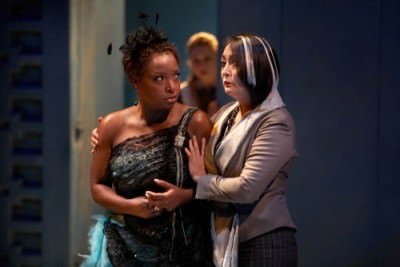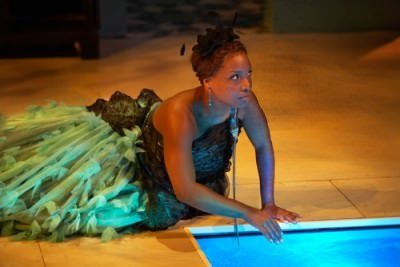Fedra: Queen of Haiti
At Lookingglass Theatre
Written by and featuring J. Nicole Brooks
Directed by Laura Eason
Disappointing opening: myth misses the mark
Lookingglass Theater is well know for taking risks — mounting plays that stretch the limits of imagination and open new dramatic frontiers. Unfortunately, this time the company’s reach exceeded its grasp.

Fedra (aka Phaedra) is a modern retelling of a Greek myth of unrequited lust and revenge. Queen Fedra (J. Nicole Books) – much like Potiphar’s wife in the Bible – fails to seduce the object of her affection and retaliates by crying rape. Not only does her stepson Hippolytus (Anthony Fleming III) reject her advances, but he loves another — Aricia (Sharina Martin), an enemy of the family who has been imprisoned since she was eight years old.

All this occurs during the brief time when “Hip” (as he prefers to be called) and Fedra believe that King Theseus (Morocco Omari) has been killed in a plane crash. Not only does Hell have no fury like a woman scorned, but this particular Hell is supplemented by two forces: the politically ambitious nurse Enone (Lisa Tejero), who thinks up the accusation, and jealous, vengeful Goddess Afrodite (Tamberla Perry), who really has it in for this family.
The play opens with a stunning vision of Afrodite, striding on ramparts high above the stage in a dazzling red gown. As she gestures, thunder roars down on the mere mortals, punctuating her power to lead them towards disaster.
The tight, successful first act builds up to a climactic moment when Hippolytus violently rejects Fedra’s advances. In the far less cohesive Act II, the King returns, and the story moves towards its inevitable, violent and tragic conclusion.
Afrodite, who has remained above the fray – although directing it — descends from the heavens to the stage, and in picking up a dagger unexpectedly lessens the effectiveness of her role as a powerful goddess. When the Goddess later engages in dialogue with Fedra, the role is further diminished. Prior to this, she spoke from on high, but did not converse. This highly inconsistent characterization breaks the unity of her role. A successful catalyst should not engage in the action.
Another discordant note is in the use of a small pool set into the stage. An old adage states that if a character opens a cabinet and reveals a gun, that gun must be used in the drama. The same applies to this pool. In Act I, the pool is peripheral to the action. Occasionally, a character may speak into it, or drop in a bauble, or briefly splash a hand, or wash a face. However, like an audience who view a gun in a cupboard, we waited, expectantly, to see the pool put into more immediate use.
And it happens – but not with any integral tie to the plot. Fedra, struggling with Theseus, walks in. He pursues and slays her there. Then she drags herself out to die on dry land. Why? What’s the point of these wet actors? If the pool must be incorporated into the action, why not drown someone?
It is possible to raise even more questions. Why was this play set in Haiti? Why is the year 2012? Both artistic choices are as irrelevant to the plot as is the pool. Actress/playwright J. Nicole Brook’s interpretation of the myth becomes a colorful pastiche, not an integrated story.
On a more positive note – the acting was fine (as is to be expected with this excellent ensemble); the scenery was provocative and interesting, as were the costumes (as were also expected); the flaw lies in this interpretation of the play which fails improve on that of Euripides, Seneca or Racine.
Not Recommended.
By Beverly Friend
Jeff Recommended
At Lookingglass Theatre, Water Tower Water Works, 821 N. Michigan Ave., at Pearson, call 312-337-0665, or visit lookingglasstheatre.org, tickets $28-62, 7:30 p.m. Wednesdays through Sundays, 3 p.m. Saturdays and Sundays, running time is 2 hours with intermission, through Nov. 15. Discounted parking is available at the Olympia Centre Garage (161 E. Chicago Ave.)
Editor’s Note: I agree with Beverly Friend’s review of Fedra: Queen of Haiti. I was troubled with the clash of styles–running form foul-mouthed hip-hop language to comic style to melodramatic tragedy. that shift made for an uneven work. I also thought that J. Nicole Brooks played Fedra as a complete nasty, vain character devoid of any redeeming quality making her character a pure villain. The clash of styles and the “R” language devalued the play.
Not Recommended
Tom Williams
